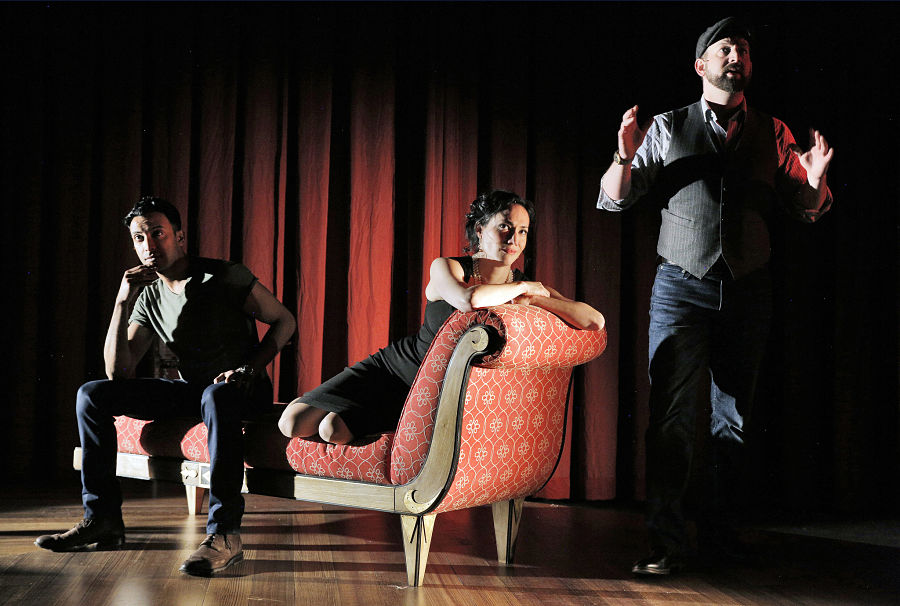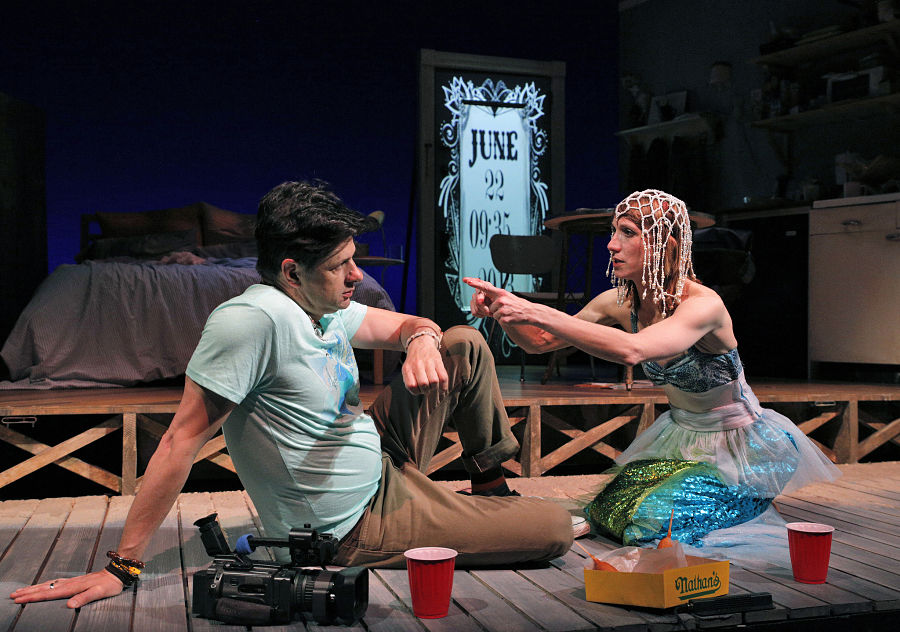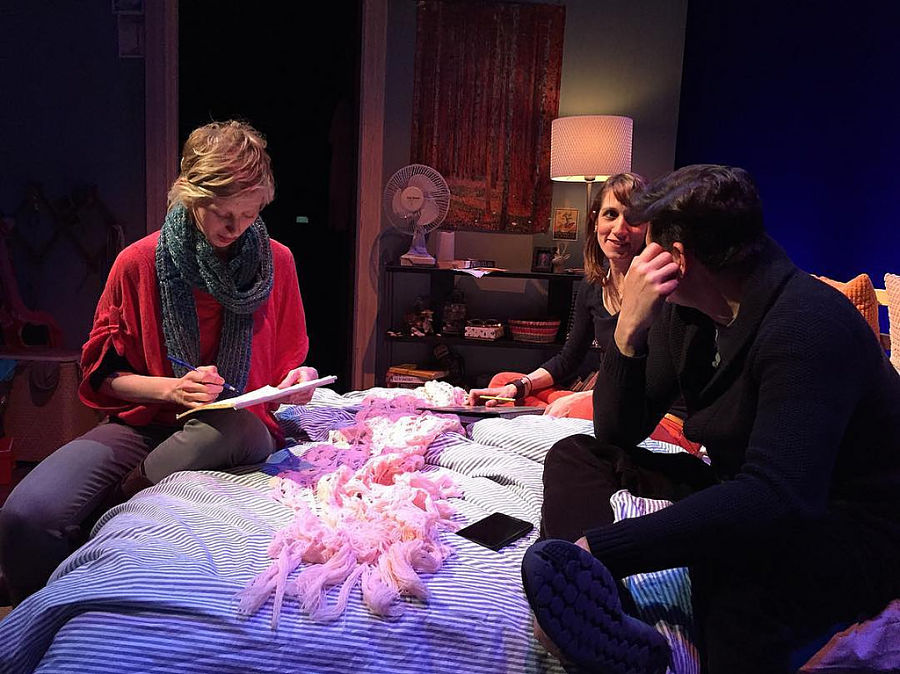KANSAS CITY, MO.: Theatre has always been a political field, and if the East and West Coasts are the establishment strongholds, the Midwest is the grassroots contender giving them a run for their money—particularly with new plays. And with a population of about 2 million, Kansas City, Mo., is a prime location for America’s newest theatre mecca. The city’s rich cultural history lends itself to a fascinating, contemporary Midwestern voice, and Kansas City Repertory Theatre’s inaugural OriginKC New Works Festival is the latest venture drawing national attention to the city.
KC Rep artistic director Eric Rosen and director of new works Marissa Wolf used their combined experience and passion for fresh voices to program the event, which began on April 23 and runs through May 22. Rosen, a founding member of Chicago’s About Face Theatre, and Wolf, former artistic director at Crowded Fire in San Francisco, share a vision for the future of the Rep that promises to make it a force in the national new play scene.
“I have built a lot of my career on championing new work from women writers and playwrights of color,” says Wolf. “Kansas City loves to support artists and artisans. You’ve been seeing it for decades here, and now we’re just joining the fray in a powerful new way.”
Bringing new works to the company has been one of Rosen’s priorities since he arrived at the theatre from Chicago eight years ago. But more than just producing new plays onstage, Rosen has increased the theatre’s focus on playwright development. He cites bringing Nathan Louis Jackson (Broke-ology) on as playwright-in-residence with the support of a Mellon grant as one of step toward upping the company’s new-play profile.
“The festival was a logical next step for us,” adds Rosen. “Figuring out how we support writers and what we can do that’s unique to KC—the geographic location, the city’s makeup, the nature of the audience—and unique to our field.”
And Rosen says one thing that makes OriginKC event stand out is the commitment to actually producing the works. “Theatre happens in the production, not in readings,” Rosen explains. “My plays never begin to take shape until we’re in the rehearsal process, in the design phase, and playwrights can’t get that experience very often while in the context of a developmental phase.”
Festival attendees have the opportunity to see two world premiere productions on the Copaken stage as part of the event. Rinne Groff’s Fire in Dreamland and Rosen’s Lot’s Wife play in rotating repertory, together filling the last slot of the theatre’s 2015-16 season. Both shows explore the volatile temperament of artists, and both the love and chaos that they often create.
Directed by Wolf, Lost in Dreamland begins with a woman, Kate, in tears on the Coney Island boardwalk. The story then flashes back to Kate and Jaap Hooft, a Bulgarian filmmaker, who goes from stranger to lover to boyfriend to business partner to fiancé. then back to stranger. Jaap engages Kate in his film about a 1911 fire that destroyed an iconic and grand park known as Dreamland, and Kate becomes so enthralled by the project that she takes it on as her own, ultimately leading to the end of their relationship.
Lot’s Wife also explores where personal relationships intersect with artistic drama, but Rosen’s play is more tragic than Groff’s more comedic one. Directed by Joanie Schultz, the play follows Adam Mace (Rusty Sneary), who copes with his grief over the loss of his wife and baby by writing a play—his first in years. He maintains control by forcing his ex-boyfriend to relive what happened onstage every night, as the drama opens old wounds.

In addition to the full productions, the festival also boasted three stage readings for an industry weekend May 13-15. The three invited playwrights were Larissa FastHorse, Christina Anderson, and Kansas City resident Michelle Tyrene Johnson. Both FastHorse’s and Anderson’s works will premiere in rotating rep as part of next year’s OriginKC. While the three reading spots were filled by women of color, Rosen says that was a happy accident, as he chose the plays based on merit and his desire to see the stories told.
FastHorse’s What Would Crazy Horse Do? follows two Ku Klux Klan members who approach the last survivors of the fictional Marahotah tribe with the hope of collaborating on an event. Evan, who’s in line to become Grand Imperial Wizard, and Rebel, her hothead sidekick, spin their words to make their proposal sound appealing to Journey and Calvin Good Eagle, who have just lost their grandfather and are struggling to hold onto each other. As Evan explains the rationale behind the KKK’s belief in separation and purity of the races as it pertains to a dying culture of Native people, it rings an unsettling note of resonance.
Although FastHorse’s play has been studied in classrooms, it hasn’t received a full production yet, partly due to the potential scarcity of Native actors to play Journey and Calvin. FastHorse says she’s made the decision to allow non-Native actors to be cast if absolutely necessary so that the story can be heard. “If Native American people aren’t having their stories told in American theatre, then they’re not having their stories told anywhere,” FastHorse says.
Johnson, who has spent time as an attorney and a diversity/inclusion consultant, called on both of those backgrounds to inform her writing of Rites of Passage. The timely play follows two lawyers faced with a difficult situation when a police officer seeks their representation after an African-American teenager is shot. The reading received a standing ovation.
“Even in the most serious pieces I write, I have bits of humor,” says Johnson, who calls herself the “new kid on the block,” as she only took up playwriting five years ago. “I think they live side by side.”

The final reading was Anderson’s Man in Love, a look at the transitory lifestyle of people during the Great Depression, when many people migrated to new cities looking for work. The play follows a serial killer, Paul, and opens with his latest victim’s body curled underneath a table. Paul enters with breakfast, engaging the corpse in a one-sided conversation. He wipes his feet on her body while he stabs at the food on his plate and reads the paper. And that’s just the beginning.
Another highlight of the industry weekend was the diversity panel, which featured all of the playwrights, director/choreographer Sam Pinkleton, playwright-in-residence Jackson, Rosen, Wolf, and Theatre Communications Group executive director Teresa Eyring. The group discussed the urgency of addressing the racial disparity among writers and theatre practitioners.
“I felt really inspired and buoyed by the ‘feet to the fire’ feeling of this weekend,” reflects Wolf. “It felt really urgent to me, and so necessary right now.”
For his part Rosen says he’s looking forward to creating a space that serves the next generation of theatre leaders. “Hopefully this is just the beginning,” he says.


